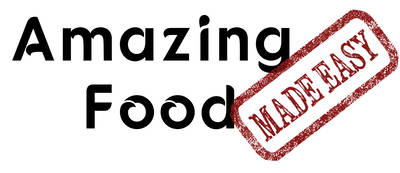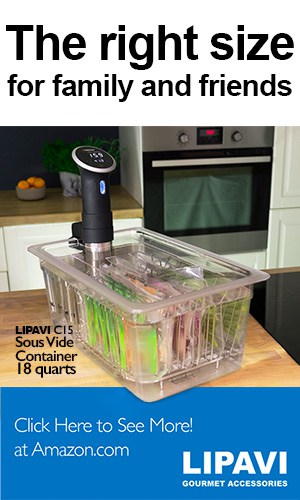-
Sous Vide Time and Temperatures
Sous Vide Time and Temps
Sous Vide Time and Temps
Sous Vide Temps
- All Sous Vide Temperatures
- Sous Vide Beef Temperatures
- Sous Vide Chicken Temperatures
- Sous Vide Duck Temperatures
- Sous Vide Fish Temperatures
- Sous Vide Vegetables Temperatures
- Sous Vide Infusions Temperatures
- Sous Vide Lamb Temperatures
- Sous Vide Pork Temperatures
- Sous Vide Shellfish Temperatures
- Sous Vide Turkey Temperatures
- Recipes Recipes Recipes Recipes
- Getting Started Guides Getting Started Guides Getting Started
- Equipment and Tools Equipment and Tools Equipment Equipment and Tools
- More Resources More Resources Resources More Resources
The Shape of Food to Come - Taste Talks Brooklyn
More Sous Vide Articles
•
Event Coverage
Click here to get great sous vide content via email
Written by Jason Logsdon
This is part of my series of recaps from the Brooklyn Taste Talks panels I attended.
One huge benefit of living in Brooklyn is the easy access to events like this one, it was being held a few miles from my house. A negative is that you usually take the subway, and in late summer it's like a sauna down there. By the time my 30 minute trip was over I was dripping with sweat, not the best way to start off the conference. Luckily this first panel quickly made me glad I decided to attend.
The Panelists
This panel has some of the most innovative chef's in the city on it.
Ready to start talking about food of the Future @wyliedufresne @fabianvonhauske @tastetalks #tastetalks pic.twitter.com/LjKXNX1Uc4
— kate krader (@kkrader) September 10, 2016
Wylie Dufresne helped lead modernist cooking into the mainstream at his restaurants like 71 Clinton Fresh Food, wd~50, and Alder.
Jeremiah Stone and Fabian von Hauske are both newer to the New York "head chef" scene and have gotten rave reviews for their restaurants Contra and Wildair. In addition to their innovative food, they also have some innovations in service, such as pulling in a rotating cast of great chefs from around the world to take over Contra for a night or two. This gives New Yorkers access to amazing chefs that you wouldn't be able to get unless you flew to another country. Both of their restaurants are near the top of my places to try in New York, and listening to them speak just made me want to go more.
The moderator was Kate Krader from Bloomberg.
All three chefs seemed very friendly and well-spoken, which was nice to see from chefs of their caliber. Jeremiah and Fabian even hung around after the panel talking to some of us in the audience.
Here's some of the highlights from their talk.
Note: I didn't bring a recorder with me, so all quotes are either what I jotted down or what I remembered but the words aren't verbatim. I tried to do my best to capture the spirit of what they were saying but if they come across negative in any way it's because I screwed up the quote, not because of what they said originally.
On the New York Restaurant Scene
"It's hard to make a living as a destination restaurant in NYC...that's why I'm doing doughnuts." - @wyliedufresne #tastetalks
— We Could Make That (@wecouldmakethat) September 10, 2016
All three panelists discussed how hard it is to be a "destination" restaurant in New York because there's so much else to do here as well. Wylie pointed out that there are almost 30,000 restaurants in New York. Later clarifying "yeah, but there's a LOT of bad ones too, it's worth mentioning."
They also discussed how hard it is to keep a mid-priced restaurant open with increasing rents, increasing wages, and increasing competition. Running a fine dining place is easy because you can charge so much, and running a fast-casual place is easy because you have so much turnover, but maintaining something in the middle is increasingly difficult.
The representation of restaurants in every economic strata is what makes a city a great food city--@wyliedufresne pic.twitter.com/MeY19jE9Hz
— Taste Talks (@TasteTalks) September 10, 2016
They see many restaurants moving up to the second or third floors in buildings, similar to Hong Kong, to save on rents. In a later panel, some chefs discussed that restaurant prices are about $22 per foot in St. Louis for a great location and $135 in New York, up to $250 per foot in some areas so you are already trying to cover 5x costs in rent right off the bat.
Wylie called on us the consumers as the ones who need to help preserve the mid-tier restaurants by going to them, otherwise that type of innovative and relatively inexpensive food (compared to fine dining places) will go away.
Jeremiah also discussed that one of New York's biggest culinary strengths is that you can find a real good version of almost any cuisine here. From Italian or French to African, Korean, or Ethiopian you can find great versions of that food in the city, which is something most other cities don't have.
On Wildair
When asked what their inspiration was for Wildair, Jeremiah explained that they were influenced by the great places they would go to when traveling overseas, places you could go and have a glass of wine in 20 minutes or stay for several hours and have a multi-course meal.
They originally wanted it to only have a limited menu but once they started planning it they couldn't narrow it down and ended up with a much larger menu than expected.
An audience member asked how you actually say "Wildair" because she's heard it several ways. Jeremiah and Fabian both said "Sure, you say it like..." and proceeded to pronounce it differently. Followed by "Who knows? It's made up!"...so if someone corrects you for saying it "wrong" you can let them know there is no right way to say it.
What Will Be Popular Soon
Fabian discussed the concept that old ideas are continually coming back (think pressure cooking and homemade bread) so he thinks a lot of future cooking will be things that were popular several decades ago.
On Convenience
Kate Krader asked what food delivery services, fast-casual restaurants, and other convenience-based delivery methods meant for chefs, especially with David Chang making a big bet in that direction.
Wylie started by admitting that he uses Marly's Spoon (an overseas version of Blue Apron, basically a food delivery service that sends you all the ingredients ready to cook and you just have to do it yourself) sometimes for busy weekday meals. Though he stressed he doesn't always follow the directions (which based on his cuisine isn't surprising in the least). He also mentioned that he's really not that good of a cook for two people, he has a much easier time cooking for 20 or 100.
Wylie also discussed how convenience is nice, but sometimes you want a really nice meal that you can't prepare at home, and meals like they serve are almost impossible to recreate in your home kitchen because of all the various components.
Fabian said "you fall in love with food through the experiences you have at a restaurant" to which Wylie replied "I guess that's why you were always sneaking into my restaurant growing up".
"You fall in love with food through the experience of a restaurant, through the romanticism of someone serving you.." #TasteTalks
— Summer Suleiman (@SummerSuleiman) September 10, 2016
Wylie also clarified that he thinks restaurants are really important, but if you have 21 meals a week, being able to get good food conveniently for a large part of them is a great thing and you can go to restaurants for the other meals.
Jeremiah addressed the David Chang delivery meals (basically upscale meals that are designed to travel really well for home delivery) and talked about how they wouldn't consider that direction because it doesn't play into their strengths as chefs (his and Fabian's, specifically).
They all agree that David Chang will probably be successful because he's proven he knows what he's doing when it comes to restaurants and making eaters happy.
Afterwards
After the talk, both Fabian and Jeremiah stuck around and chatted with people until the organizers kicked us out so the next session could get underway. They happened to be standing right next to me so I got to participate as another session goer was asking Jeremiah some real good questions:
- About "adulterated" foods:
- It's generally only bad in fast-food or processed foods and trying to trick consumers.
- Most respectable chefs aren't trying to hide anything or do anything wrong, they are trying to increase flavor and enjoyment for their diners.
- Adding something to a liquid to help with mouthfeel, or using a technique to shape an ingredient, is great if it's done in an attempt to make it taste better.
- Most of the techniques and ingredients are all natural, use plant-based or bacteria-based ingredients and/or enzymes.
- On the current reports of mislabeled foods in restaurants:
- There are some shady restaurants, and you can generally tell who they are by their prices...i.e. a wagyu steak for $15 is not imported, high quality wagyu.
- A lot of chefs aren't trying to be sneaky but there's only so much information you can put on a menu (this information control came up in the Heritage panel).
- At Contra they serve a beef "wagyu" dish, using a strain of cows containing wagyu, black angus, and another variety and it starts to become unwieldy to list out everything and most consumers don't care.
- Especially for foreign ingredients there's often a translation / description issue, so it's referred to as "sea bass" because the flesh looks and behaves like sea bass so that's how it's referred, as opposed to calling it by its native name that no one would understand.
You can read all my Brooklyn Taste Talk Recaps or let me know what you think in the comments below.
 This article is by me, Jason Logsdon. I'm an adventurous home cook and professional blogger who loves to try new things, especially when it comes to cooking. I've explored everything from sous vide and whipping siphons to pressure cookers and blow torches; created foams, gels and spheres; made barrel aged cocktails and brewed beer. I have also written 10 cookbooks on modernist cooking and sous vide and I run the AmazingFoodMadeEasy.com website.
This article is by me, Jason Logsdon. I'm an adventurous home cook and professional blogger who loves to try new things, especially when it comes to cooking. I've explored everything from sous vide and whipping siphons to pressure cookers and blow torches; created foams, gels and spheres; made barrel aged cocktails and brewed beer. I have also written 10 cookbooks on modernist cooking and sous vide and I run the AmazingFoodMadeEasy.com website.
Affiliate Disclaimer: Some links on this site might be affiliate links that if used to purchased products I might receive money. I like money but I will not endorse something I don't believe in. Please feel free to directly go to any products I link to and bypass the referral link if you feel uncomfortable with me receiving funds.













